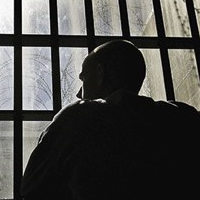Being Locked Up in Jail before Trial Increases Odds of Conviction
 (photo: Peter Macdiarmid, Getty Images)
(photo: Peter Macdiarmid, Getty Images)
By Antoine Goldet, Center for Investigative Reporting
On paper, bail is pretty simple. You are charged with a crime, and the court asks you for an amount of money as bond, and then returns it when you show up for the hearing. If you have the money, you can go home and prepare an adequate defense. But what if you can’t make bail?
A new study (pdf) by the National Bureau of Economic Research, which analyzed over 420,000 cases in Philadelphia and Miami-Dade counties, found that being incarcerated before trial significantly increases the likelihood of being convicted.
The researchers concluded that pretrial detention makes defendants more likely to plead guilty by 27.5 percent and more likely to be found guilty by a jury by 27.3 percent.
Rodney Roberts was one of these detained defendants. Before he agreed to plead guilty to a crime he did not commit, he had already spent several weeks locked-up in the Essex County jail in New Jersey.
Roberts, then a 29-year-old salesman and father from Newark, had been arrested for a parole violation and subsequently charged with aggravated sexual assault. The court had set bail at $50,000, and he was unable to pay.
Roberts had been convicted of a felony in the same court 10 years earlier and knew the odds would be stacked against him if he pushed for a trial. When his public defender told him that pleading guilty to the downgraded charge of kidnapping was the best option for him, Roberts felt trapped by a system and accepted.
A 2013 analysis conducted in the jails of New Jersey – where Roberts spent 18 years wrongly incarcerated following his guilty plea – found that 38.5 percent of the total population was “held in custody solely due to their inability to meet the terms of bail.” Like Roberts, many of them chose to forfeit their right to a jury trial after being unable to post bail.
The discriminatory nature of the bail system is not breaking news. As early as 1961, New York City Correction Commissioner Anna Cross said that “remaining in jail because you can’t get bail is really being punished before you’re even found guilty.” Earlier this week, two other studies highlighted other issues, including finding that those detained before their trial were more likely to commit crimes on their release.
What is remarkable is the proportions it has taken over the past three decades.
“Each year, the United States imprisons more than half a million individuals who have never been convicted of a crime, largely because they are unable to post bail” – 20 percent of the total incarcerated population, the researchers wrote.
Pretrial detention also has a long-term impact on defendants’ employment status and income, with substantial differences in earnings of released and detained defendants persisting three to four years post-bail, the study found.
“As public defenders in one of the most under-resourced and over-policed communities in the United States, we see first-hand the devastating consequences of pre-trial detention,” Robin Steinberg, founder and executive director of The Bronx Defenders, wrote in an email.
“People can end up losing their livelihoods, their homes, and even their children, when forced to wait in jail for their day in court, simply because they cannot afford cash bail. Most come under tremendous pressure to take a plea bargain – regardless of guilt, innocence or the long term collateral consequences of getting a criminal conviction.”
This story was produced by Reveal from The Center for Investigative Reporting, a nonprofit news organization based in the San Francisco Bay Area. Learn more at revealnews.org and subscribe to the Reveal podcast, produced with PRX, at revealnews.org/podcast.
To Learn More:
The Effects of Pre-Trial Detention on Conviction, Future Crime, and Employment: Evidence from Randomly Assigned Judges (by Will Dobbie, Jacob Goldin and Crystal Yang) (pdf)
Most People in U.S. Jails have not yet been Tried (by Noel Brinkerhoff, AllGov)
- Top Stories
- Unusual News
- Where is the Money Going?
- Controversies
- U.S. and the World
- Appointments and Resignations
- Latest News
- Donald Trump Has a Mental Health Problem and It Has a Name
- Trump Goes on Renaming Frenzy
- Trump Deports JD Vance and His Wife
- Trump Offers to Return Alaska to Russia
- Musk and Trump Fire Members of Congress






Comments